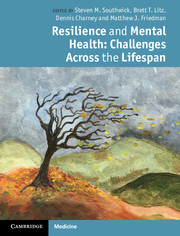Preface
Published online by Cambridge University Press: 07 September 2011
Summary
Preface
Humans are remarkably resilient in the face of crises, traumas, disabilities, attachment losses, and ongoing adversities. In fact, resilience to stress and trauma may be the norm rather than the exception. However, to date, most research in the field of traumatic stress has focused on neurobiological, psychological, and social factors associated with trauma-related psychopathology and deficits in psychosocial functioning. While much has been learned in these areas of research, particularly about post-traumatic stress disorder (PTSD), far less is known about resilience to stress and healthy adaptation to stress and trauma.
The study of resilience is enormously challenging. The first hurdle involves definition. Currently, there is no single agreed-upon definition of resilience in the clinical or scientific literature. In a review of the published literature on risk, vulnerability, resistance, and resilience, Layne and colleagues (2007) described the lack of precision and numerous terminological inconsistencies in the meanings of these concepts, and identified at least eight distinct meanings for the term “resilience.” For example, definitions of resilience have ranged from symptom-free functioning following trauma exposure (Bonanno et al., 2006) to positive adaptation despite adversity (Garmezy, 1993), and even to enhanced psychobiological regulation of stress/fear-related brain circuitry, neurotransmitters, and hormones (Charney, 2004). The American Psychological Association (2010) has defined resilience as “the process of adapting well in the face of adversity, trauma, tragedy, threats or even significant sources of threat.”
- Type
- Chapter
- Information
- Resilience and Mental HealthChallenges Across the Lifespan, pp. xi - xviPublisher: Cambridge University PressPrint publication year: 2011
- 4
- Cited by



